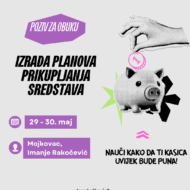WHAT IS P2P ON-DEMAND?
It is an opportunity for civil society organisations (CSOs) and informal groups to propose and participate in events that bring people together from across the Western Balkans and Türkiye region (WBT region) and the EU.
The EU TACSO 3 project will select from the best ideas and will work with the winning applicants to turn their ideas into reality.
WHAT KIND OF EVENTS ARE SUPPORTED?
Meetings, workshops, conferences, study tours of people from one part of the region to another or the EU, or other kinds of activities that bring people together from across the region and the EU.
WHAT KIND OF IDEAS WILL WIN?
The winning ideas will be in line with the thematic priorities of the European Union in the region, and will also be feasible, innovative, and exciting. The ideas should contribute to creating genuine new partnerships between people, informal groups, and CSOs. The ideas that can show they will lead to longer-term benefits will be scored more highly.
WHAT ARE THE THEMATIC PRIORITIES FOR THE P2P ON-DEMAND INITIATIVE?
The following themes below are currently the thematic priorities for the EU and the EU TACSO 3 project. Ideas for events that are in line with at least one of these priorities will be given preference.
- Governance of civil society organisations
- Green Transition
- Digital Transition
- Skills for Non-Profits
- Enabling Environment for Civil Society
Ideas that include addressing gender issues and the inclusion of marginalised groups within the thematic priorities will be given preference.
WHO CAN APPLY?
All registered CSOs, non-registered and informal community groups based in the WBT region – Albania, Bosnia and Herzegovina, Kosovo*[1], Montenegro, North Macedonia, Serbia and Türkiye are eligible to apply. EU TACSO 3 encourages joint applications between organisations/non-registered and informal community groups and across the territory of the WBT region.
HOW DO I APPLY?
Applying online via LINK HERE will bring your application to us through the customer relationship management (CRM) system.
You will be invited to submit your idea, including a brief description of the proposed event, a draft agenda, and an estimate of the costs involved. The application form contains more information to guide your application.
In case you have any problems accessing the link, please contact us via email at p2p@tacso.eu and we will send you the application form via e-mail.
The closing date for applications is Monday, 15. April, 2024.
CAN I APPLY IN MY LANGUAGE?
As part of our application process, we kindly request that you prepare the application form in English[2].
WHAT HAPPENS IF MY IDEA IS SELECTED?
If your idea is selected, the EU TACSO 3 team will work with you to develop the agenda and lists of participants, find a suitable venue, arrange travel, and host the event. Costs will be covered by the EU TACSO 3 project.
WHEN WILL THE EVENTS TAKE PLACE?
Between May and October 2024.
EU TACSO 3 Team encourages all eligible – less and more experienced civil society organisations, as well as non-registered and informal community groups, to participate in this opportunity to contribute to the advancement of civil society in the WBT region.
SELECTION AND SCORING
Evaluation of each call for ideas will refer to the following selection criteria:
- Relevance to Thematic Priorities:
How well does the idea address the specific themes of CSO governance, green transition, digital transition, skills for non-profits, and enabling environment for civil society, considering gender, disability, and intersectional perspectives?
- Inclusivity and Accessibility:
Does the idea consider the needs and perspectives of diverse groups, including women, people with disabilities, and marginalised communities?
Is the proposal accessible to people with disabilities and designed to ensure inclusivity in participation and access to benefits?
- Impact and Sustainability:
What is the potential impact of the idea on advancing gender equality, disability inclusion, and addressing intersectional challenges within the thematic areas?
Is the proposed solution in the long term sustainable and does it contribute positively to environmental, social, and economic goals?
- Innovation and Scalability:
How innovative is the proposed approach in addressing the identified challenges?
Can the idea be scaled up or replicated to benefit a larger audience or community, including diverse groups?
- Collaboration and Partnerships:
Does the proposal demonstrate collaboration with relevant stakeholders, such as other organisations, formal and non-formal groups, including CSOs, public authorities, and communities?
Are there partnerships in place to ensure effective implementation and maximisation of resources?
- Capacity Building and Empowerment:
Does the idea include provisions for capacity building and skill development, particularly for marginalised groups and non-profits?
To what extent does the proposal empower individuals and communities to actively participate in decision-making processes and initiatives?
- Adaptability and Flexibility:
Is the proposal adaptable to changing circumstances, including technological advancements and evolving socio-economic contexts?
Does it have mechanisms for feedback and improvement based on lessons learned and stakeholder input?
- Ethical and Legal Considerations:
Does the idea adhere to ethical standards and legal frameworks related to data privacy, human rights, and inclusivity? Are there safeguards in place to prevent harm and ensure accountability?





